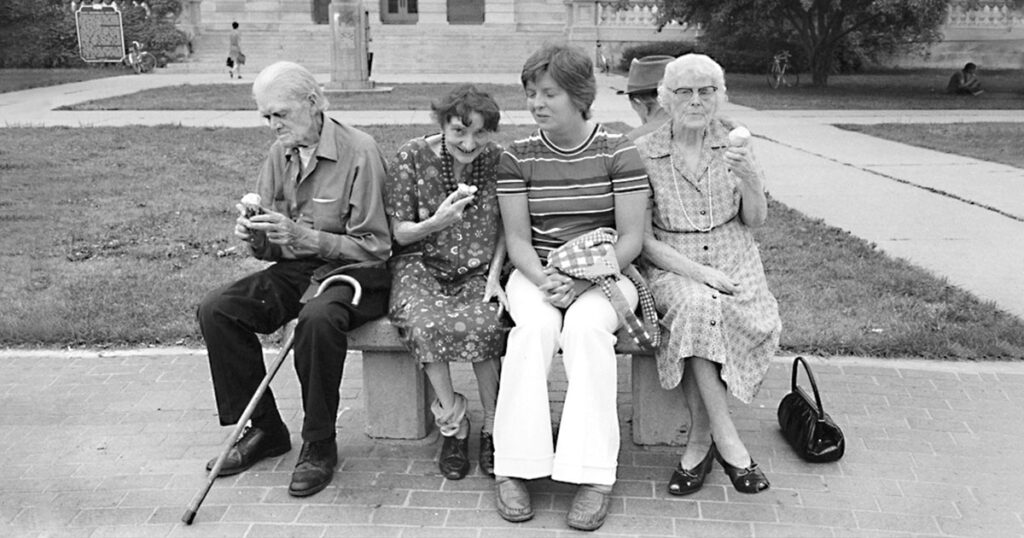
One spring morning, I returned from a run just as my neighbor, an old woman who lives alone and whose principal function seems to be to keep watch over the comings and goings on our street, was taking a turn outside. She walked along jerkily with her twin forearm crutches, pausing every few steps to rest. She had reached the end of the lane and was turning around in front of my house when I drew up, panting and perspiring. “My, my,” she said, her voice scratchy with age. “Why run so much?”
“Why anything?” I answered, still huffing. “Why live so much?”
I regretted the words the instant they were out of my mouth. I had meant to make a general comment—not so much on the overall purposelessness of life as on the arbitrariness of our choices. But the pair of rhetorical questions about the point of any activity, it occurred to me, might be easily misunderstood by my neighbor as a hint that she had already lived enough. She might even ask herself the question I had voiced, “Why live so much?” Even worse, “What purpose do I serve?” could be the sad query of an old woman who, at 92, might realize she is a burden.
I am convinced that my spunky neighbor is not such a woman. If she did misunderstand my comment, she would be astonished at the effrontery, not disheartened by a hard truth. Her two children come several times every day to tend to her needs, but she is not the kind to moan about being a burden or lament needing them. That doesn’t mean she’s adjusted gracefully. I can picture her shaking off a steadying hand and snapping at whoever overestimates her need.
How much help to offer and how much to insist on giving is a tricky matter, as my friends and I are learning as we age and our parents grow old. Gentle guidance can be taken as suffocating control. On my visit this summer to my mother in Magdalena, New Mexico, I reacquainted myself with a woman about my age whom I’d met last year, the daughter of a widower who makes visits to her father both to check up on him and to enjoy his company while she takes refuge from the summer heat, humidity, and hurricanes of her home in Louisiana. When I bumped into her at the farmer’s market, she told me that over the past year, she had become concerned about him—his rapidly worsening memory, his worrisome driving, his childlike unguardedness. I mentioned my stepfather, who in his last years had become obsessed with winning the lottery and had fallen for some moneymaking schemes. Yes, the same with her father, she said: a lack of caution that might make him an easy prey for a scam. As if life were a party and everyone you encounter a fellow guest for you to happily engage with.
Later, when I joined my new friend and her father for a cup of coffee at the café, I mentioned a few details about my visit to Magdalena, and almost everything I said made me cringe as I heard it come out of my mouth—mention of not wanting to see my mother in an old people’s residence; of my mother’s driving; of the difficulty of helping but not taking over; of giving advice but not instructing. What was I doing, talking about aging in front of an old person? Was this not akin to talking about alcoholism in front of an alcoholic? Or vanity in front of a clotheshorse? Unbridled appetite in front of an incorrigible gourmand? Might not her father hear these words and think they applied to him as well? Of course he might—they did! One should not remind people of their weaknesses or failings, their misfortunes or unhappiness.
But age is not a weakness or a failing. It doesn’t have to be a misfortune. My aging mother has satisfactions I know nothing of. A certain carefree spirit is one of them. A great many worries that no longer bother her. “Oh well,” comes easily to her in reaction to a plan gone awry, for example, when I would feel compelled to search for a solution. Not every problem has a solution, we both understand, but she also seems to know that not every problem needs one. She knows how to let go. So perhaps caretakers needn’t strive to protect the aged from all disappointments. No need and no chance. As the aging children of old parents know—and this is the status of nearly all my friends these days, except for the few who have buried both mother and father—we will one day be those old people. If I were to hide anything from anybody, maybe that is what should be kept under wraps. Not what we are but what we will one day be, just like our parents. What a future! What a problem! “Oh well,” my mother might say. She’d be right. What applied so obviously to the father applied to his daughter, too, and to me. Why hide from the facts? Better get used to them. Old age is not for sissies, said Bette Davis. Life isn’t an endless party. Oh well.

